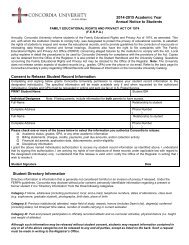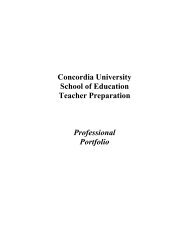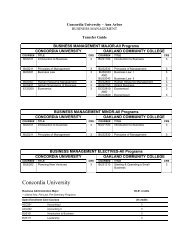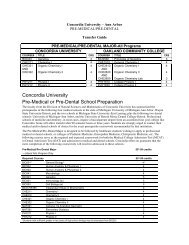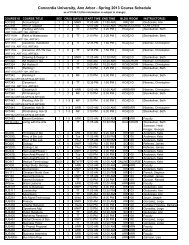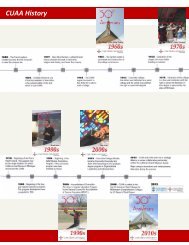2009â2010 Academic Catalog - Concordia University Ann Arbor
2009â2010 Academic Catalog - Concordia University Ann Arbor
2009â2010 Academic Catalog - Concordia University Ann Arbor
Create successful ePaper yourself
Turn your PDF publications into a flip-book with our unique Google optimized e-Paper software.
<strong>Concordia</strong> <strong>University</strong> <strong>Ann</strong> <strong>Arbor</strong> 2009–2010 <strong>Academic</strong> <strong>Catalog</strong><br />
Physics<br />
Psychology<br />
Religious Studies<br />
Social Studies<br />
Sociology<br />
Youth Studies<br />
Guidelines for Individualized Majors and Minors<br />
Students may design individualized majors or minors if the existing curriculum does not meet their specific<br />
needs. Such sequences must be consistent with the mission and purpose of <strong>Concordia</strong> <strong>University</strong>. The number<br />
of credits required must be consistent with the number required in standard majors or minors at <strong>Concordia</strong><br />
<strong>University</strong>, <strong>Ann</strong> <strong>Arbor</strong>. The following additional criteria apply:<br />
a. The quality of the proposed major or minor must be comparable to that of generally approved<br />
majors or minors;<br />
b. Two-thirds of the major and one-half of the minor must be at the upper level;<br />
c. No more than one-third of the courses offered for the major/minor may be in General Studies;<br />
d. No more than one-third of the credits may be accepted in transfer;<br />
e. Independent studies and internships are limited to forty percent of the major or minor;<br />
f. Students must take courses from more than one faculty member.<br />
Students take the initiative in designing the curriculum. Students prepare a one-to-three word title and rationale<br />
for their design, with a listing of courses to be completed. The design may be disciplinary in nature,<br />
interdisciplinary, or thematic. It may stand alone as a sequence. If a minor, it may offer collateral support for a<br />
primary sequence or career goal. Students select one or more advisors and obtain approval of the division(s)<br />
involved in the major or minor upon recommendation of the advisors. The Vice President of <strong>Academic</strong>s<br />
oversees the process, approves each individualized major and minor, and initiates evaluation through the<br />
Assessment Committee.<br />
DEGREE REQUIREMENTS<br />
Revisions in degree requirements and academic regulations take effect on the first day of July following their<br />
adoption by the faculty and the Board of Regents. Students at <strong>Concordia</strong> <strong>University</strong> will normally follow the<br />
degree requirements and academic regulations in effect at the time of their admission; however, a student who<br />
changes a major, minor, or program may be required to follow the requirements in effect at the time of the<br />
change. Such a decision would be based on the availability of required courses and may be appealed to the<br />
appropriate dean. Revised requirements by government agencies or certification associations may influence the<br />
student’s degree requirements regardless of previously stated requirements.<br />
Students are expected to read the regulations of the <strong>University</strong> and to conform to them. The student, not the<br />
<strong>University</strong> or any member of the faculty or staff, is responsible for meeting the requirements for a degree.<br />
Petition forms for the substitution or waiver of a requirement are available from the Registrar and must be<br />
approved.<br />
Registration and payment of fees imply an agreement by the student to conform to regulations of the<br />
<strong>University</strong>. Failure to meet obligations to the <strong>University</strong>, financial or otherwise, will be cause for refusal to<br />
issue a degree, transcript, and/or diploma.<br />
Final responsibility for meeting all graduation requirements rests with the student.<br />
Bachelor of Arts Degree (B.A.)<br />
All students must complete the following requirements described below to earn a bachelor’s degree.<br />
Proficiency Requirements*<br />
General Studies Core<br />
Major(s)/Minor(s)/Program(s)<br />
Major(s) and/or Minor(s) – minimum: 30 credits<br />
Senior Project: 1-5 credits<br />
0-10 credits<br />
37 credits<br />
30+ credits<br />
Pg. 28 of 118



